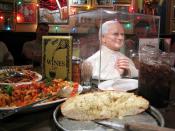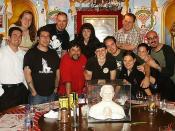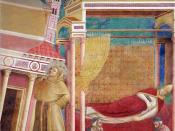There were several dissenting movements prior to Martin Luther that revolved around questioning Church authority and dogma.
In the early Thirteenth Century, the Albigensian heresy or Catharism became especially prominent in central southern France (where the town of Albi was located). Albigensian belief was dualistic: that is, they saw the universe as a struggle between good and evil. They believed that the physical world was inherently corrupt, evil and the creation of Satan, while the spiritual universe was the realm of the good God. As a worldly organization, the Christian church was perceived as evil and renounced by the Albigensians. Despite the extremism of Catharism (indeed, perhaps because of its extremism), it attracted large numbers of followers, including some highly placed nobles. The church hierarchy took strenuous action against this heresy, including a crusade called by Pope Innocent III in 1209 to wipe out the Albigensian movement. (Albigencian)
Another dissenter who did not stray as far from the church was Saint Francis of Assisi.
He was born at Assisi in Umbria, in 1181. Although his early life was one of privilege, after a series of dreams and visions, he gave up all his worldly goods and lived a life of poverty. As he preached, he gathered followers and when they numbered eleven he gave them a short Rule. He went to Rome and, despite some opposition from Cardinals, worried that the emphasis on poverty would dangerously contrast with their lives of opulence, received approval from Pope Innocent III for the brotherhood. They traveled throughout central Italy and beyond, preaching for people to turn from the world to Christ. In his life and preaching, Francis emphasized simplicity and poverty, relying on God's providence rather than worldly goods. Eventually he gave up the leadership of the Order and went to the mountains...


